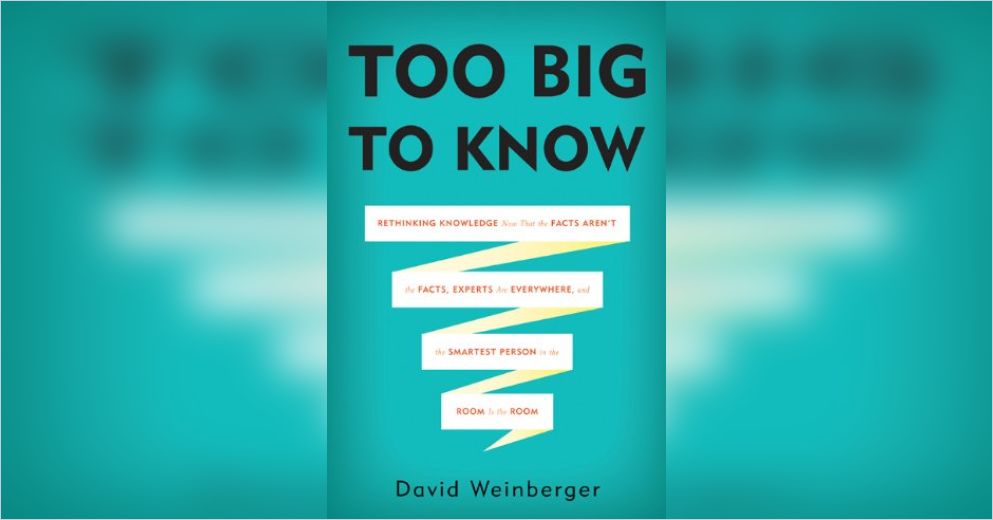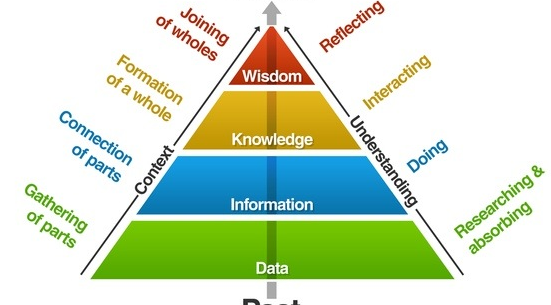David Weinberger: Challenging The Notion Of Knowledge

Posted by TallyFox on 24 April 2017
David Weinberger's perspective is truly unique. We might say that the reason is his work as David is the co-author of the Cluetrain Manifesto, senior researcher at the leading Harvard Internet center, a writer with innumerable publications in Wired, Harvard Business Review, KMWorld, Scientific American, to name a few, and a sought after keynote speaker around the world who leaves the audience smiling.

But the answer perhaps lies in his philosopher's training and years of experience on the front lines of the Internet economy.
When businesses want to discover the ways in which our networked technology is challenging our most basic assumptions, changing customer expectations, and realigning economic interests, they come to him.
David’s book, ”Too Big To Know, Rethinking Knowledge Now that the Facts aren't the Facts, Experts are Everywhere, and the Smartest Person in the Room is the Room” offers a unique perspective that we, in the knowledge management business, should take into consideration.
TallyFox: Your book, Too Big To Know, introduces the notion that “the smartest person in the room is the room itself”, the room being the network that joins people and ideas in the room and connects to those outside of it. Where do you see technology/ software in this premise?
David Weinberger: The premise of the book Too Big To Know is that there is far more for us to know than our brains can manage. Our primary strategy has been to reduce what we need to know to what we can manage with the tools and the mental capacity that we have. In the age of networks, we are able to know things in new ways. So, rather than managing knowledge by reducing it so it can fit, for example, in a book, we now can build knowledge by building networks of people who are connected with one another in some type of conversation. A conversation may be a post that links to another post, which is a limited form of conversation but it could go all the way to an actual conversation of two human beings contextualising that information, supplementing it, pointing out to related ideas, some of which may contradict it. It is in that web of differences that knowledge actually lives, enabling knowledge to scale up in ways that it couldn't before.
TallyFox: Does this change the notion of expertise?
David Weinberger: I think it certainly changes the role of experts. I assume that the traditional sorts of experts, such as scholars who make a certain topic their calling, will always be there and will be people we can rely on. But the notion of experts remaining as a stopping point, as an authority that simply can be believed, I think that to a large degree has already gone away. The conversation doesn't simply stop with them. I assume that this makes experts such as Stephen Hawking very happy because he's a scientist and he likes the fact that people are going to question what he says. Generally speaking, throughout business and government, we are relying less on experts as final authorities, which, overall, is a really healthy thing.

TallyFox: What happens when you move this into a business setting?
David Weinberger: A business in my view should be trying to build a web of knowledge which should include everyone, from the knowledge workers to anyone who has any stake in the company at all. We can’t predict what we're going to need to know, so we want an open network that's expressed in various conversational forms. It should provide a variety of filters, possibly enabling the people in the network to filter for one another.
In these webs, people learn in public. You can see that at the great, Q&A site, Stackoverflow, but also of course at Wikipedia. But one of the key things in a knowledge system is not to treat knowledge as a set of identifiable assets that should be placed in a repository and made available. That's a type of reductive filtering that misses the fact that what makes something knowledge – valuable knowledge – is contextual and contingent. You don't know what you're going to need to know. That's why I like to see organisations adopt a knowledge strategy that stays as inclusive as possible.
TallyFox: What do you mean when you say “filter”?
David Weinberger: In the late 1980s we came up with the Data-Information-Knowledge Wisdom pyramid, which reflects in its very shape this idea of knowledge as a result of filtering. In order to make sense of data we said we filtered it from the bottom of the pyramid to the top. But knowledge isn't a reduction of information. It's an enriching of it. The pyramid is a very weird idea of knowledge and it is very limiting.

TallyFox: Why is that?
David Weinberger: Because so much of what, for example, an organisation knows and needs to know is important only contextually. There's no filter that you can apply that's going to be identified as knowledge if there isn’t an existing context for it. Someday, however, there may be a context. We pay an enormous price for filtering because it means we throw out information.
TallyFox: Clay Shirky says there is no such thing as information overload, only filter failure.
David Weinberger: As usual, Clay is right. And brilliant. But it's also important to notice that in the networked world, filters work differently. In the real world, when you use a filter, you remove the part you don't want. That's what publishers do when they reject a manuscript, or a library when it buys some books but not others. If you want to see that manuscript or book, it is physically difficult.
On the Net, filtering is different. If you post a report that has filtered among all the possible sources, you aren't making the sources that don't have a link to your report harder to get to. They're all still right there, on line. On the Net, we don't filter out. We filter forward: by linking you just reduce the number of clicks it takes to get to the resource. Everything else stays completely discoverable and findable. In fact, it's now easier and less costly to include everything, rather than try to filter and curate a collection. Include everything and provide tools to let your users filter on the way out. That way you don't have to predict what they're going to want to learn and know. No one can't predict that.

TallyFox: Is taxonomy useful as a way of filtering information?
David Weinberger: Taxonomies can be a way of filtering forward, but we should keep in mind that a taxonomy is just a tool, and no tool is right for every job. Taxonomies focus on some aspects of what they're classifying and discard the rest.They thereby provide a type of order which makes it easy to find what we’re looking for, which is a very useful thing, but they can also hide information at which point they can get in our way. It is vital for an organisation to provide many ways to find information. From my view, taxonomies are just one way of filtering and using information.
TallyFox: What would you advise?
David Weinberger: The issues and problems that a business has can not be anticipated, so the idea that we can survey all of our sources, identify the knowledge, put that into a knowledge management system and provide data management tools and declare it as our corporate knowledge restricts the information to what we can now imagine we need, not what we don't yet know we need.,
Knowledge is not an identifiable set of things. It is what an organization needs in order to respond to change. A knowledge management system that simply filters knowledge out is and not forward is stripping information from the organization.
TallyFox: Can you give us an insight on what you are working on at the moment?
David Weinberger: I’ve just published an article on what machine learning and in particular deep learning means for our idea of knowledge and I'm currently working on the book for Harvard Business on our new idea on what the future is and how it works.
TallyFox: What is the motivation behind writing the book?
David Weinberger: In some way, it parallels what I've been saying about knowledge. For tens of thousands of years, our best strategy for dealing with future has been to anticipate and prepare for it. This, obviously, works pretty well as we are the dominant species on the planet but we also pay a tremendous price for it because we can be erroneous in our assumptions which can cause serious consequences. On the other hand, technologies and businesses are using a different path. Facebook opened up its own platform for developers to build whatever they want. This is a case of very purposefully not anticipating what people will build, and enabling them to build things that Facebook would never ever thought about. The book analyses many other examples of a pretty radical change in our understanding. Rather than anticipating and preparing for the future let's very purposefully not anticipate it.
We’re looking forward to reading it.

Comments
Leave a comment